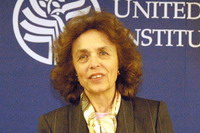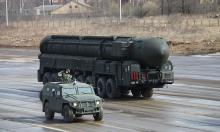Iranian-American scholar is not spy
An Iranian-American scholar prisoned in Iran beyond the reach of Swiss diplomats and other outsiders has never been a spy.

"Iran is trying to turn a scholar into a spy," Lee H. Hamilton, president and director of the Woodrow Wilson International Center for Scholars, said at a news conference on the plight of Haleh Esfandiari.
She was detained Dec. 30 as she prepared to return to the Washington area after a semiannual visit to her ailing 93-year-old Iranian mother and was interrogated over more than five months before being jailed virtually incommunicado.
Iranian television, which often speaks for the government, said the 67-year-old grandmother, who heads the Wilson Center's Middle East program and lives in a Maryland suburb of Washington, is being charged with "seeking to topple the ruling Islamic establishment."
"Haleh is a scholar and has never been a spy," Hamilton said.
He described her program as one of promoting dialogue with Middle Eastern countries, including Iran, and said in response to a question that she did not pursue such activities on her visit to Tehran that began Dec. 21.
During questioning, "threats were made," Hamilton said, but "she was not beaten, to our knowledge." Since she was jailed in Tehran's Evin prison on May 8, "no one has seen her to our knowledge," he said.
Her mother is allowed to deliver medicine to the prison, but Swiss diplomats, who look after U.S. interests in Iran in the absence of formal U.S.-Iranian relations, were not permitted to visit with Esfandiari, Hamilton said.
"We do not know anything about her treatment in prison," he said.
On Monday, Ryan Crocker, the U.S. ambassador to Iraq, is to hold direct talks in Baghdad with Iranian diplomats. The Bush administration has said the talks would be entirely about the situation in Iraq, while Crocker has been quoted as saying they could lead to an improvement in U.S.-Iranian relations.
Ray Takeyh, a senior fellow at the Council on Foreign Relations, said, "It is sort of mind-boggling to me that we can have discussions that mean more to Iranians than to us while there is a hostage crisis going on."
"And we are not even going to mention the hostage," Takeyh said in an interview.
"If I were in charge of the U.S. government I would say to them privately we are going to review that meeting so long as she is being held," Takeyh said in an interview.
Geoffrey Kemp, director of regional programs at the Nixon Center, said in a separate interview, "There is nothing inconsistent in holding bilateral talks with Iran on mutual interests in Iraq while at the same time putting maximum moral and diplomatic pressure on Iran to release a completely innocent scholar who has done much to improve U.S.-Iranian relations."
Subscribe to Pravda.Ru Telegram channel, Facebook, RSS!




